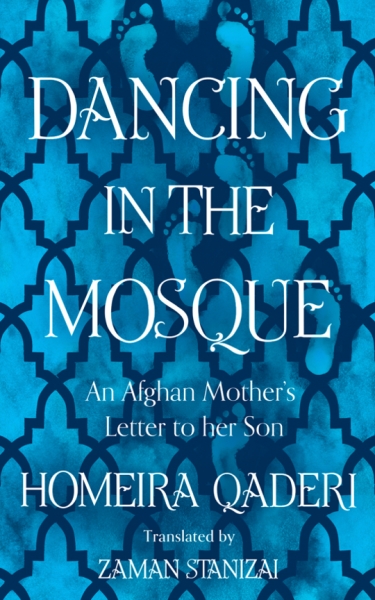Dancing in the Mosque
By Homeira Qaderi

Blurb
In the days before Homeira Qaderi gave birth to her son, Siawash, the road to the hospital in Kabul would often be barricaded because of the frequent suicide explosions. With the city and the military on edge, it was not uncommon for an armed soldier to point his gun at the pregnant woman’s bulging stomach, terrified that she was hiding a bomb. Propelled by the love she held for her soon-to-be-born child, Homeira walked through blood and wreckage to reach the hospital doors. But the joy of her beautiful son’s birth was soon overshadowed by other dangers that would threaten her life.
No ordinary Afghan woman, Homeira refused to cower under the strictures of a misogynistic social order. Defying the law, at the age of thirteen, she risked her freedom to teach children reading and writing and fought for women’s rights in her theocratic and patriarchal society.
Devastating in its power, Dancing in the Mosque is a mother’s searing letter to the son she was forced to leave behind. In telling her story – and that of Afghan women – Homeira challenges us to reconsider the meaning of motherhood, sacrifice, and survival.
Our Review
Dancing in the Mosque: An Afghan Mother’s Letter to her Son is an insightful and heart-wrenching book by an incredibly brave woman.
In this outstanding piece of non-fiction Homeira Qaderi lays bare the everyday experiences of life under in Afghanistan under both Russian and Taliban rule.
Within the book are open and honest letters from Homeira to her son telling of the anguish she experiences from not seeing him and knowing that his father has said she is dead.
“My motherhood didn’t last long. I lost you early on, to the cursed laws of the city, when you were still a breastfeeding nineteen-month-old baby.
It has been 985 nights since you were taken from me. It had been 985 nights since the howling wind wolves have ripped through my lullabies.”
It was intriguing reading about the small and larger ways women and girls are treated differently than their male counterparts in Afghanistan.
“In the stories she saved for me, there were no jinnis or magic wands to make my dreams come true. My stories were populated with wild monsters…My grandmother had more monster stories than beads on her tasbeh. The purpose of her stories were primarily to stop me playing with boys, cutting my hair, wearing short skirts, climbing trees, talking to the neighbour girl over the wall, laughing out loud, and even arguing with Nanah-jan. If I did any of those forbidden things, she would tell me: A monster will appear out of thin air and drag me off to some horrible place where he will eat my flesh and lick my bones or worse, make me his wife and force me to bear a brood of little hateful ogres.”
One of the things that helped her during her situation was reading Russian literature.
“In the books taken from the underground box, there were no burqas. There were no girls whipped with pomegranate branches and they were never traded for fighting dogs. There was no girl given away to the city’s aged holyman, no beaten girl who threw herself down a well to avoid being stoned to death. There was no girl forced by her father to wear boys’ clothes and to play the role of the family’s son. In those buried books, women didn’t whisper their stories to the water or go to graveyards to talk with the dead about their loneliness.”
This is not a light-hearted book and definitely not easy to read but it helps that you know from the outset that she survived and that she made the right choices. The book provides hope that those who have been denied a voice can find it again.
“I know that you’ve been told I am dead. But I am not dead, my dear Siawash I am very much alive. I am your mother. My name is Homeira. And this is my voice.”
Our Final Rating...
Read & Shared 44 Times.



Get In Touch
Please feel free to leave a comment to this book review below. Or even leave your own review if you like.
If you run a blog and/or have posted a review to this book, a Q & A or general author interview online you can always add a trackback to it here and following moderation we'll add a link to it below.